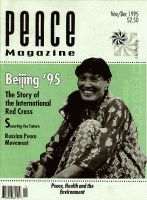
Peace Magazine Nov-Dec 1995, page 15. Some rights reserved.
Search for other articles by Ross Wilcock here
The word "violence" is linguistically related to vile, violate, evil, and devil. (Did I miss "violin?" No, for it too can be an instrument of torture!)
Perhaps violence always was, and always will be. Violence in its worst form becomes war, that which nations and groups of nations prepare for and execute in periodic paroxysms of misery and waste.
World War II was at the time the worst such experience in history. Mass production turned into mass extermination. To speak of six million Jews, 12 million Ukrainians, 40 million Russians, is only the beginning of morbid accounting. Every force imaginable was harnessed for destruction, including the energy processes of the sun released in war upon the earth.
When the dust settled and tears had dried, moral reaction set in. The United Nations was formed, with the glorious Universal Declaration of Human Rights. The Nuremberg War Crimes Process apportioned the guilt of malignant Nazism. This landmark event in human history treated war as crime and some criminals paid the ultimate penalty. Many others, no less guilty of moral and criminal atrocities, escaped judgment. But hopes turned sour.
So began the Cold War--in fact before World War II was officially over. It lasted 40 years and was signed off only by the Treaty of Paris in 1992. During all this time, the Cold War had a hold on people's minds, education, occupation, and the whole direction of human development. In the Gorbachev years, profound euphoria accompanied a liberation that has been called the greatest event in 200 years.
Yet there remains a major deficiency in the mechanism of international justice. One simply cannot determine how to initiate proceedings over war crimes and crimes against humanity. It is not a healthy human situation when crime is seen to pay, and tyranny fulfills its evil will. How many rapes, how many deaths, how many mass graves are necessary before War Crimes and Crimes against Humanity proceedings are initiated? Does the answer lie in Bosnia? What about Rwanda and Chechnya?
One practical response to this problem would be to develop an International Violence Registry. There is, as I have found, no address to which complaints can be directed or evidence submitted about war crimes. Therefore there is no reliable quantification of abuse. It is not surprising that bureaucratic official bodies don't have a good handle on the problem. It is not a pleasant thing to be involved with, so perhaps information of this kind gets "swept beneath the carpet."
I can say this because I have collected Human Rights material on the Chechnya situation which I believe needs to be submitted for official consideration pertaining to War Crimes and Crimes Against Humanity. I have found that there is no proper address or body prepared to receive and act upon such material. This came to me as a great surprise. Much good work has been done by the United Nations and elsewhere to create glowing conventions and statements about how things ought to be, but there is a serious deficiency of implementation "where the rubber hits the road." The time has come to set in motion a process that will catch human monsters at a early stage. If there had been such a process, the great violence and evil attributed to Lenin, Stalin, and Hitler might have been prevented. In those times, the absence of communication technology and data processing made such a proposal impractical. Today, the technology exists, as surely does the idealism and goodwill that will be necessary.
The logic in this proposal is that if abusive processes can be identified and detected much earlier, they would be susceptible to modification before getting out of control. An analogy could be made to radar, which can detect the approach of immediate physical threats.
My hypothesis is that abuses of the Universal Declaration of Human Rights are collective threats to humanity, which may herald by only a matter of months, actual massacres and genocidal events.
It is true for all humanity, both locally and globally, that we are judged not only by our achievements, but by how we treat the weakest and neediest among us. Who is more needy than a person being or having been deprived of land, liberty, dignity, and life?
Obstacles to the development of peace and security include cost and lack of commitment. Yet everybody understands that defense is the largest budget item and war is the most enormous waste of life and resources.
Would an International Violence Registry contribute toward a better world? Can the administration of international justice somehow develop proactive and preventive capabilities? Or will crime always pay? And will political power always be measured by mass graves?
Ross Wilcock is a physician and activist in Woodstock ON.

Peace Magazine Nov-Dec 1995, page 15. Some rights reserved.
Search for other articles by Ross Wilcock here